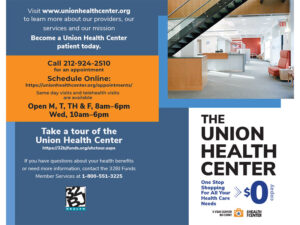Patient-centered Care, 100 Years Strong
The Union Health Center (UHC) traces its founding to 1914 by the International Ladies’ Garment Workers’ Union (ILGWU) to provide healthcare to its members. Although the garment industry in New York City has faded, UHC continues to prioritize caring for the health and well-being of working people—including 32BJ members and their families.
In 2012, the 32BJ Health Fund partnered with UHC to establish its 5 Star Center model where plan participants pay a $0 copay. As the Health Fund expanded the model across several states, UHC remains its flagship center. The partnership evolved as plan participants expressed enthusiasm for UHC’s patient-centered care, and as the 32BJ Health Fund’s claims data showed UHC’s ability to create better outcomes for patients, including lower rates of hospital admissions and emergency room visits, compared to the rest of the network even after adjusting for case mix. Today, more than 70 percent of UHC’s 11,000 patients are 32BJ Health Fund plan participants.
A shared interest in delivering the best care drives the 32BJ Health Fund and UHC to work together to identify opportunities to improve care and reduce costs. Assessing referral patterns has been a key effort for the partnership and highlights the value that can be created when payers and providers collaborate.
Like most providers, UHC wasn’t able to access data on the cost of care for its patients. Most purchasers and insurers generally don’t share this information with primary care providers, which hinders providers’ ability to provide cost-effective care. But as a proactive purchaser, the 32BJ Health Fund was able to analyze its claims data for plan participants receiving care at UHC and share its analysis with UHC. After reviewing their claims data, the 32BJ Health Fund discovered notable findings including: 1) UHC sometimes directed patients to an expensive health system compared to other high-quality health systems in the same city; 2) some specialists conducted disproportionately higher rates of testing than other specialists in the same field for patients with similar conditions.
With this insightful analysis in hand, UHC made cost-effective changes in its referral patterns. First, it steered hospital admissions from a higher-cost hospital toward a lower-cost, but high-quality, hospital. Second, it applied a similar approach to patient referrals to specialists with lower testing rates. Replacing the specialty group with a high rate of testing with a different specialty group in the same field reduced the rate at which plan participants received low-value testing. This change resulted in savings of more than $110,000 in one year for just one specialty group of providers.
“Healthcare is very complex and multi-factorial, but we use data in partnership with the 32BJ Health Fund to identify opportunities for improvement. The partnership allows for innovation, emphasizes problem solving, and demands accountability for the patients we serve.”
– Harris K. Lampert, CEO and Medical Director of Union Health Center
The joint effort to ensure that the 32BJ Health Fund plan participants receiving care at UHC use cost-effective providers continues. When the 32BJ Health Fund changed its network—whereby plan participants continued to have low copays at most hospitals but would have much higher copays at some of the most expensive hospitals—UHC ensured that its referrals and affiliations were in line with the 32BJ Health Fund’s preferred hospital network. This means that patients won’t have high copays for the care they need, and that the 32BJ Health Fund doesn’t pay excess rates for care at the most expensive hospitals.
What hasn’t changed is the high-quality care that patients get at UHC, which uses a specialized team-based model of primary care that emphasizes appropriate care tailored to the needs and goals of individual patients. UHC builds its primary care model around health coaches—medical assistants trained in patient-centered care—who work closely with the highest-risk patients. Patients are referred to a health coach by their primary care physicians. All care takes place within the team, but each team member has a role based on their training and skills. Health coaches specifically engage patients with chronic conditions (e.g., diabetes and hypertension) and those needing follow-up care after hospital discharge to help them achieve the best possible outcomes. This close attention can help prevent recurrent illness and readmission to the hospital.
In its everyday practice, UHC strives for innovative ways to better utilize resources and improve outcomes. Although medicine has changed considerably over the last century, UHC continues to provide working people in New York City with high-value healthcare. Partnering with the 32BJ Health Fund keeps UHC grounded in its history and mission and focused on the incremental innovations that will improve primary care.
© 2019 32BJ Health Fund


